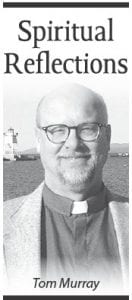On June 15, 1920, one of the most heinous acts of mob violence in our state’s history took place in downtown Duluth. Following a circus performance, a group of men spent the night getting the show ready to move on. As they worked, two teenagers sat behind the big top and watched. Whatever happened between those two and that group of workers is unclear, but the next morning they reported that they had been beaten and robbed, and that one of them had been assaulted by a group of six black men.
Even though a local doctor examined them and found no evidence of an assault, six men were summarily thrown into jail as rumors of the assault spread throughout the city. An angry mob formed and the door to the jail was broken in. Three of the men were hauled down the street, beaten and hanged from a light post at the corner of First Street and Second Avenue East.
The Gospel of Luke records a similar act of violence taking place when Jesus returned to his hometown to preach in the synagogue. A mob of angry people dragged Jesus to a cliff where they intended to throw him to his death. I suspect that the root cause of this act of violence had much in common with what took place in Duluth 96 years ago.
Mob violence often begins with a small handful of loud, angry and influential people inciting a crowd to join them. Whether the violence is racial, religious, gender-based or political, it almost always shares a common thread, which is fear of the unknown. Mob violence centers itself in fear of that which is foreign and unfamiliar.
To the people of Duluth in 1920 it was the fear of an African-American community the people had been told would undercut wages and devalue home prices. According to Luke’s account of Jesus’ homecoming, it was the fear of God’s acceptance of outsiders that caused a spontaneous mob to rise up and attempt to kill Jesus. It was the fear that those people, whoever they are, might be invited to be on the inside instead of where they rightfully belong, which is on the outside looking in.
Perhaps the reason Jesus’ neighbors became so angry with him is because he used scripture to contradict their long-held sense of entitlement and privilege. When he proclaimed that, in God’s eyes, Syrian and Phoenician lives matter, they didn’t want to hear it. And yet, Jesus is always pushing and probing at the boundaries we draw around ourselves. He’s constantly reminding us that God is both present and active outside of the walls we construct hoping to keep ourselves safe from the unknown.
So … who is out there, on the outside, hidden from us, yet beloved by God? And perhaps more important, how do we share our own risen life with them? These are not just tough questions; they are divisive questions, especially in today’s political and religious climate. But these are questions that we cannot avoid asking ourselves. And as we contemplate this we’ll want to remember what is found at the heart of the promise of Jesus’ kingdom as St. Luke shares it with us.
It is Luke’s gospel that proclaims that the hungry will be filled, the rich sent away empty and the proud scattered. These are words that Luke places front and center in his gospel so that we’ll all know going in what God’s plan for salvation is going to look like. And what it looks like is going to make us uncomfortable.
When we declare that God’s love for this world extends beyond our own sheltered community, beyond our most-loved traditions, and even beyond the boundaries of our religion, it angers that part of us that clings to self-righteousness. And yet we are called to do just that. This gospel that we share, a gospel that challenges us to step out and away from what is comfortable and safe, comes with a promise.
That promise is this: because we have been baptized into Christ, and because Christ was raised from the dead, we are therefore set free from self-righteousness. We have no need to be possessive of our faith. We have no need to exclude others from our fellowship. We have been raised with Christ to a life of grace that extends out and into the beautifully diverse world that surrounds us.
The time of God’s favor that Jesus announced is still being fulfilled some 2,000 years after he unrolled that scroll and proclaimed the words of Isaiah to his astonished neighbors. It is being fulfilled in a world desperate to hear the joyful news that Jesus is risen, that we are loved without condition, and that we are held close by the hands of God.
Each month a member of the Cook County Ministerium will offer Spiritual Reflections. This month’s contributor is Tom Murray of the Lutsen Lutheran Church and Baptism River Community Church of Finland.



Loading Comments